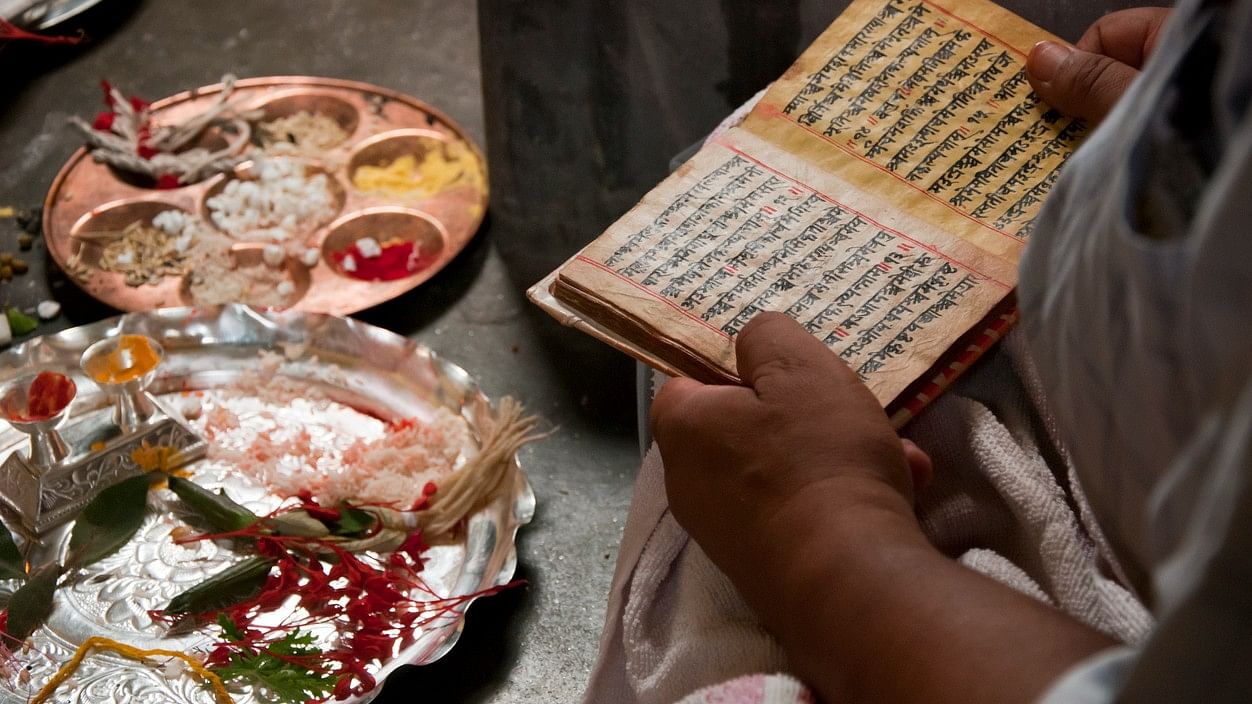
The word 'sanatan' has its roots in Sanskrit which can be translated into "eternal", "ancient", "venerable", or "unshakeable".
Credit: iStock Photo
DMK leader Udhayanidhi Stalin, on September 2, stirred up a hornet's nest when he equated 'Sanatan Dharma' to "dengue, Covid-19, malaria and mosquitoes".
Needless to say, this didn't go down well with the ruling Modi government, neither did it receive a unanimous support from the Opposition bloc. Leaders like Mamata Banerjee and Arvind Kejriwal refrained to side with Udhayanidhi's controversial remark.
Amid the hullaballoo, let's dive in deep and unravel the mystery behind the term 'Sanatan Dharma' -- often seen as a synonym for Hinduism.
Etymology
The word 'sanatan' has its roots in Sanskrit which can be translated into "eternal", "ancient", "venerable", or "unshakeable". Hence, 'Sanatan Dharma', as per popular Hindu beliefs, is a religion which has existed since time immemorial.
Author-cum-mythologist Devdutt Patnaik posted on X that the word 'sanatan' does not feature in the Vedas. “The word 'sanatan' was first used in the Bhagavad Gita, and refers to knowledge of the soul, which is eternal,” Patnaik clarified in a video he posted on X.
“One can say that Sanatan Dharma refers to eternal religions which believe in soul and rebirth,” he said.
As per ISKCON Educational Services, 'sanatan dharma' in Hinduism is used to denote the set of duties and practices incumbent upon all Hindus. Another related meaning is “that which is integral to something". For example, the dharma of sugar is to be sweet and the dharma of fire to be hot.
In his book, Hindus: Their Religious Beliefs and Practices, Julius J Lipner says, "the term ‘Sanatan Dharma’ was used in the Bhagwat Gita by Arjuna, when he told Krishna that 'when the clan is vitiated, the sanatan-dharmas of the clan are destroyed'."
Lipner is Emeritus Professor of Hinduism and the Comparative Study of Religion at the University of Cambridge.
Sanatan or Sanantana?
Some scholars argue that 'sanatan' in Sanskrit was derived from the Pali word 'sanantana', which also means "eternal". Pali is the language of the Tripitaka - sacred book of Thervada Buddhists. It contains much of Buddha's speech and his tales post attaining enlightenment.
Pali is closely related to Sanskrit and some words in both the languages are found interchangeably.
In ancient India, Pali and Prakrits were the most widely spoken languages among commoners, since the usage of Sanskrit was largely restricted to Brahmins as it was codified in a way that only the latter had access to it.
Pali is also said to be the language in which Buddha spoke and gave his sermons in.
Does Sanatan Dharma endorse caste system?
In his book, Revolution and Counter Revolution in Ancient India, Dr BR Ambedkar very unabashedly puts, "The history of India is a history of mortal conflict between Buddhism and Brahmanism".
Modern day Hindutva fans will argue and deny this tooth and nail. However, going back in history shows us that the above statement by Ambedkar does hold water. Skimming through HIndu scriptures like Manusmriti, Gita, Ramayana, etc. produce some heavy-duty incriminating evidence against Brahminism.
Sample this: In the Uttara Kaand of Ramayana (sarga 73-76), the killing of a Shudra named Shambuka by Ram is very explicitly mentioned.
"When Rama is reigning as a virtuous king, a humble aged Brahmin comes to him, weeping, with his dead son in his arms. He says that Rama must have committed some sin, or else his son would not have died."
"The sage Narada explains to Rama that a Shudra is practicing penances, and this is the cause of the child's death. Rama goes on a tour of inspection in his flying chariot, and finds an ascetic doing austerities, and asks who he is."
"Hearing the [inquiring] words of Rama of imperishable exploits, that ascetic, his head still hanging downwards [as part of his austerities] answered:— 'O Rama, I was born of a Shudra alliance and I am performing this rigorous penance in order to acquire the status of a God in this body. I am not telling a lie, O Rama, I wish to attain the Celestial Region. Know that I am a Shudra and my name is Shambuka."
"As he was yet speaking, Raghava [Rama], drawing his brilliant and stainless sword from its scabbard, cut off his head. The Shudra being slain, all the Gods and their leaders with Agni's followers, cried out, 'Well done! Well done!' overwhelming Rama with praise, and a rain of celestial flowers of divine fragrance fell on all sides, scattered by Vayu."
"In their supreme satisfaction, the Gods said to that hero, Rama:— 'Thou hast protected the interests of the Gods, O Highly Intelligent Prince, now ask a boon, O beloved Offspring of Raghu, Destroyer of Thy Foes. By thy grace, this Shudra will not be able to attain heaven!"
Caste system remains a sticky issue in the Hindu religion which is unlikely to die anytime soon.